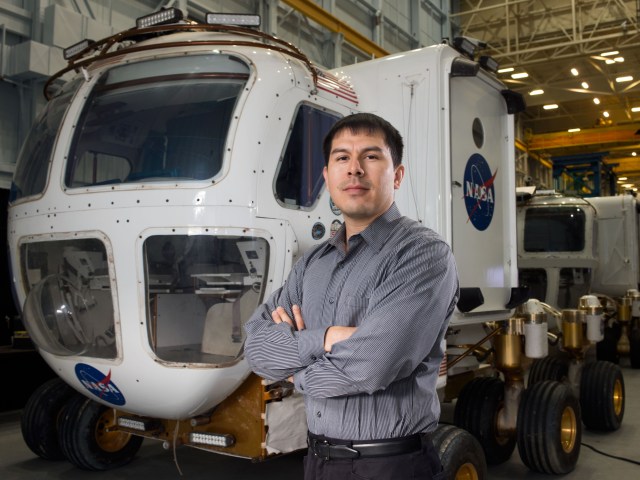“I’m working on voice capabilities, head movements, tracking eye movements. Basically we want astronauts to be able to move like Iron Man around the space station. That would be the ultimate goal,” Curiel says.
The hands-free jetpack project was created in response to the 2003 Space Shuttle Columbia disaster. After problems on the shuttle caused it to disintegrate while in space, there was a greater need for astronauts to get to areas for repairs that are usually not accessible.
When astronauts are working on a space station, they are usually tethered with wires or hooked up to a robotic arm. But in the case of an emergency, they are left with jetpacks that require both hands to be used.
“In case something happens and that breaks, they need a way to rescue themselves. They have a jetpack but they have to use both hands to maneuver back to safety,” Curiel says.
For Curiel, he always knew he would go into engineering. Born and raised in Juarez, Mexico, he was always inspired by his father.
“My father was an engineer. In my family it was never a question if any of my family was going to school,” Curiel says.
Growing up, Curiel says his family influenced his engineering spirit. He would often spend his spare time fixing toys and cars, taking them apart and seeing how they work. But he also says one of his inspirations was a somewhat unlikely figure: Leonardo DaVinci.
“He was an engineer, inventor and artist. Myself I consider a creative type and really enjoy creating, developing and materializing new ideas into something physical,” Curiel explains. “One of my pending goals is to make an invention and have a patent in my name.”
Curiel got his first degree in Mexico in Electrical Engineering at the Technological Institute of Ciudad Juarez. But he decided to move to the United States when he realized the type of engineering jobs he wanted weren’t in Mexico.
“I decided that I wanted to work for the U.S. because if I worked in Mexico I was going to work for companies where the product was already designed. And I wanted to be part of the design,” Curiel recalls.
Curiel attributes his success to his love of education.
“Education is your gateway to success,” Curiel says. “There’s no other clear path except going to school and realizing that it’s going to be hard but nothing worthwhile is going to be easy.”
But Curiel says that he wasn’t always so confident that he would make it as an engineer, mainly because of the language barrier he felt when he first came to the United States. He recalls one moment in his English language class where he almost gave up on pursuing his dreams in the United States.
“My first class final was to get up and give an oral presentation in front of the whole class. I remember thinking, I don’t think I can do this. But then I said if I fail at least I can say I tried,” Curiel says.
Now Curiel gives back to the community by working with programs that let students gain hands on experience. One program is NASA’s Microgravity University, that allows college level students to submit research proposals and be a part of Curiel’s other research project, hands free control in zero gravity.
“They get to come to Houston and fly with me on the Zero Gravity airplane that astronauts train on,” Curiel says. “This is as close as anyone can get to feel like an astronaut besides actually flying in space.”
But he also wants to help instill the creative spirit in young kids that inspired him to be an engineer. Another one of his outreach projects is the Humans in Space Youth Art Competition. Through art submissions, kids communicate to space engineers and designers what they hope the future of space to be. The art that the kids create is shown at the Humans in Space conference attended by high level space experts.
“It has been known that there is a correlation between art, creativity and abstract thinking for math skills,” Curiel says. “The youth of today will carry out this mission anyway in the next couple of years.”
He hopes to spread his message to young Latinos hoping to go into STEM fields.
“If you don’t believe in yourself, it will be hard. I think people need to recognize that things are worthwhile and challenging,” Curiel says. “I think Latinos right now need to step up to the challenge and say, ‘we’re going to fill those roles.’” by Jacquellena Carrero [NBC]



